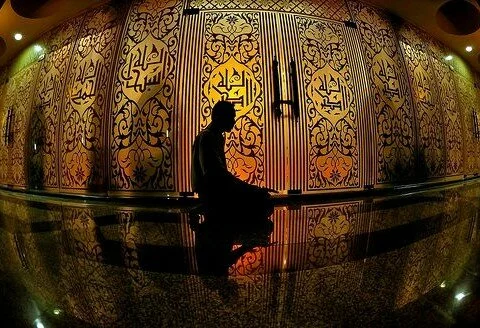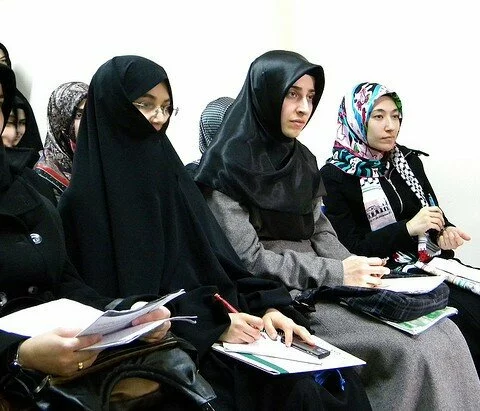Detailed Rules of I’tikaf

I’tikaaf
(1) I’tik’af means to stay in the Musjid with the niyyat of I’tikaaf for the sake of Allah Ta’ala. The purpose of such stay in the Musjid is Ibaadat and to gain proximity to Allah Ta’ala.
The types of i’tikaaf
There are three types of I’tikaaf.
Waajib, Sunnatul Muakkadah and Nafl
Waajib i’tikaaf
An I’tikaaf of Nathr and a Qadhaa I’tikaaf are wajib (compulsory) I’tikaaf.
Nathr i’tikaaf
- I’tikaaf of Nathr is an I’tikaaf undertaken as a result of a vow made to Allah Ta’ala.
- The validity of Nathr I’tikaaf requires the verbal expression of the niyyat or intention. It is, therefore, essential to verbally say, for example: ‘I am undertaking (or making) I’tikaaf for Allah Ta’ala for three days’., or any other similar statement in which it is declared that I’tikaaf has been undertaken or is presently being undertaken. The expression of an intention should not relate to the future, e.g. “It is my intention to perform I’tikaaf, etc. For the purpose of Nathr I’tikaaf only a niyyat in the mind/heart is not sufficient.
- Saum (fasting) is a condition for the validity of Nathr I’tikaaf. Nathr I’tikaaf without fasting is not valid even if one vows to observe I’tikaaf without fasting.
- There are two types of Nathr I’tikaaf. Nathr Muayyan and Nathr Ghair Muayyan. Nathr Muayyan I’tikaaf is an I’tikaaf, the observance of which, one vowed to keep on specific days, e.g. on the 13th, 14th and 15th of Muharram. If one failed to observe the I’tikaaf on the particular days stipulated in the niyyat, the I’tikaaf has to be discharged at another time, i.e. Qadha will have to be made of the I’tikaaf.
Nathr Ghair Muayyan I’tikaaf is an I’tikaaf, the observance of which is not pledged for any specific days. One merely vows to observe I’tikaaf for two days (for example). Such an I’tikaaf may be executed at any time of one’s choice.
- If in the niyyat the number of days is expressed in the plural, e.g. ‘I shall observe I’tikaaf of two days (three or four days etc.), and no specific meaning was given to the word ‘days’, then the word ‘day’ will mean 24 hours. Thus, I’tikaaf of the days as well as the nights will be obligatory.
When expressing the niyyat, if the intention is to observe I’tikaaf only during the day and not during the night, only the days will become Waajib.
If it is specified in the niyyat that I’tikaaf of only the nights will be observed, then such I’tikaaf is not obligatory.
- Similarly, if in the niyyat the term ‘nights’ was used, e.g. I have made obligatory on me an I’tikaaf of three nights’, and by the term ‘nights’ no particular meaning was intended nor specified, then I’tikaf of both the night and day will be wajib.
- If the vow was for an I’tikaf of one day only, then it will mean the day commencing from Subah Sadiq until sunset. However, if the intention was a 24 hour period, then ‘one day’ will mean from one sunset to another sunset, i.e. 24 hours – night and day.
- If the intention is to observe I’tikaf of only one day (i.e. minus the night), one should enter the Musjid just prior to Subah-Sadiq and leave at any time after sunset.
- If the intention is to observe I’tikaf for 24 hours or for several days with nights included, one should enter the Musjid before sunset and leave at any time after sunset of the last day of the I’tikaaf.
10. When Nathr (vow) is made to observe I’tikaf for several days (i.e. days including nights – 24 hour period), it will be waajib to execute the days of the I’tikaaf consecutively – one after the other without interruption. However, if at the time of the niyyat it is specified that the I’tikaaf will be interspersed, then it will be permissible to spread the number of days of the Nathr I’tikaaf over a period. It will then not be wajib to observe the I’tikaaf in consecutive order of days.
11. In a Nathr I’tikaaf in which the nights have not been included in the niyyat, it will be permissible to intersperse the days of the I’tikaf. Consecutive order in this case is not wajib.
12. A Nathr Muayyan I’tikaf (in which a specific month or particular days have been specified for the I’tikaaf) may be executed even before the specified period.
13. If it is expressed in the vow that the Nathr I’tikaf will be undertaken in Musjidul Haram, it will be permissible to observe it in any Musjid.
14. Nathr I’tikaaf may be discharged even with the Sawm of Ramadhaan. Thus, if a vow was taken to observe I’tikaaf during Ramadhaan (i.e. other than the I’tikaaf of the last 10 days), then such I’tikaaf will be valid and the fasting of Ramadhaan will suffice for the I’tikaaf.
15. Nathr I’tikaaf will be valid with any type of wajib fasting even if the Saum is Qadha or Kaffarah fasting. Thus, if one is keeping Qadhaa fasts, one may observe a Nathr I’tikaaf on such days.
16. Nathr I’tikaaf will not be valid with Nafl fasting. Thus if one intends Nathr I’tikaaf after having commenced a Nafl Saum, the Nathr I’tikaaf will not be valid.
17. The minimum period for a wajib I’tikaaf is one day, i.e. from Subah Sadiq to sunset.
Qadha of i’tikaaf
- Qadha will be made of Nathr and Masnoon I’tikaaf. There is no Qadha for Nafl I’tikaaf.
- Qadha of Nathr Muayyan I’tikaaf will be made if the I’tikaaf was not observed on its specific days or if it was rendered void while observing it.
- Masoon I’tikaaf (i.e. the I’tikaaf of the last ten days of Ramadhaan) will be made Qadha if it was rendered void after having commenced it. It is necessary to make Qadha of only the day or days which were rendered void. When making Qadha of the I’tikaaf, Saum (fasting) is obligatory. Qadha of the I’tikaaf will be valid only if fasting is also observed on the day/s when the Qadha is being made.
Sunnatul muakkadah i’tikaf
I’tikaaf of the last ten days of Ramadhaan is the only Masnoon I’tikaaf. This Masnoon I’tikaaf is Sunnatul Muakkadah alal Kifaayah. If a few or even just one person observes this I’tikaf in a particular area/neighbourhood, the duty will be discharged on behalf of the entire community of that locality. On the other hand, if no one observes this I’tikaaf, the whole community will be guilty of neglecting a Sunnatul Muakkadah obligation. Such neglect is sinful.
- The Mu’takif (the one who observes I’tikaaf will enter the Musjid before sunset of the 20th day of Ramadhaan.
- The Mu’takif will remain in the Musjid until the sighting of the Eid Hilaal is confirmed.
- Niyyat (making intention) is a necessary condition for Masnoon I’tikaaf as well.
- If the Masnoon I’tikaaf is broken or nullified, Qadha of it is obligatory.
The venue for i’tikaf
- For men. I’tikaaf is valid in only a Musjid in which Athaan and Iqaamah are proclaimed for the five daily Salaat. In other words it has to be a Musjid in which the five daily Salaat are performed with Jamaat.
- Females can observe I’tikaaf in a place in their homes, set aside for Salat or specially cordoned off for the purpose of I’tikaaf.
- It is not permissible for women to come to the Musjid to observe I’tikaaf or to perform Salaat or to listen to lectures.
- The Musjid here refers to the Musjid proper and not to the annexures or adjacent buildings erected for the needs of the Musjid or Musallees.
The Musjid proper is that section of the building which was intended by the Waqif to be the Musjid.
(Waqif is the person or organization who erected the Musjid and demarcated the Musjid boundaries).
- Most Musaajid have a section at the back, which in most cases is under the same roof, but is excluded from the Musjid proper. Janazah Salat and sometimes a second Jamaat by latecomers are performed in this section. Since this section of the building is excluded from the Musjid proper, it is not permissible for the Mu’takif to venture unnecessarily into that area. If he does, his I’tikaaf will be rendered void.
- The Mu’takif should ascertain from the Mutawallis (trustees) the exact boundaries of the Musjid.
- The Wudhu Khanah, courtyard, store-rooms and any other adjacent buildings are all excluded from the Musjid.
- It is essential that the Mu’takif remains inside the Musjid or inside the special place set aside at home (for women) throughout the duration of the I’tikaaf. Leaving the place of I’tikaf unnecessarily for even a minute will render the I’tikaf null and void.
Valid reasons for leaving the musjid and which will not break the i’tikaf
It is permissible to leave the Musjid for the following acts of need:
- To answer the call of nature – to go to the toilet.
- To pass wind.
- To take an obligatory bath
- To make wudhu
- Juma’h Salat, if Juma’h Salaat is not performed in the Musjid where the I’tikaaf is being observed. In this case the Mu’takif should leave the Musjid at such a time to enable him to reach the other Musjid in time to perform his Sunnah Salaat. He should leave immediately after having completed the six raka’ts Sunnats after the Fardh Salat. He should not delay for Dua and Dhikr.
- To proclaim the Athaan, if he is the Muath-thin. This is permissible for even a Mu’takif who is not the permanent Muath-thin.
- To bring food if there is no one to tend to this need of his.
- If one is compelled to leave the Musjid either because of danger or forceful eviction, one may immediately proceed to another Musjid to continue with the I’tikaaf. An unnecessary delay in the process of changing Musjids is not permissible and will break the I’tikaaf. When leaving the Musjid for the above mentioned reasons, the Mu’takif must return to the Musjid immediately after having fulfilled the need. An unnecessary delay of even a minute will break the I’tikaf.
The mufsidat or the things which invalidate (break) the i’tikaf
Only wajib and Masnoon I’tikaaf are rendered invalid. Nafl I’tikaaf is not rendered void by any act. It is merely ended by engaging in an act which is not permitted for the Mu’takif.
Unnecessarily leaving the Musjid for even a minute whether intentionally, unintentionally or under compulsion, will invalidate the I’tikaf. All acts and reasons besides the valid reasons (see above) will be regarded as ‘unnecesessary’ in the context of I’tikaf. Thus, leaving the Musjid due to illness, although permissible, will invalidate the I’tikaf To leave the Musjid for Janazah Salat, visiting the sick or for any other permissible activity besides the VALID REASONS (see below), will render the I’tikaaf null and void.
The I’tikaaf will also become void (break – be invalid) if the Mu’takif’s fast breaks.
The mubahaat or the things which are permissible during i’tikaf
During I’tikaf, the following acts are mubah (permissible):
- To eat and drink.
- To sleep.
- Necessary conversation.
- To change clothes and apply perfume and oil.
- To cut hair and nails. These should not be allowed to fall in the Masjid.
- To walk inside the Musjid.
- To sit anywhere inside the Musjid.
- To tend to a sick person inside the Musjid.
- If necessary, to buy and sell goods provided that the goods are not brought into the Musjid nor is payment made inside the Musjid.
10. To teach Deeni lessons.
11. To sew clothing.
12. To study Deeni books.
13. To get married and to perform a Nikah.
14. All such acts which are lawful and allowed in the Musjid are permissible for the Mu’takif.
The makruhat or the things which are detestable and not permissible for the mu’takif
The Makruhat during I’tikaf are as follows:
- To maintain total silence.
- To indulge in idle talk.
- To sleep excessively merely to wile away the time.
- To unnecessarily pass wind inside the Musjid.
- To sew garments or engage in any occupation for a fee.
- To read books and magazines which are not of a Deeni nature.
- To erect the mu’takaf in a way which inconveniences the Musallees. (Mu’takaf is the area which is enclosed for the sleeping and eating of the one who observes I’tikaf).
- To engage in any worldly activity unnecessarily.
What to do during i’tikaf
The Mu’takif should engage himself in Ibadat to the best of his ability. Nafl SalSt, Tilawat, Durood, Istighfar and permanent Thikr in general should be the Mu’takif’s occupations throughout the duration of his I’tikaaf.
When the Mu’takif speaks, he must speak only what is virtue or what is necessary.
The Mutakif should not do anything which conflicts with the spirit of I’tikaf. He should guard his heart, mind, ears, eyes and limbs against all evil, thus deriving maximum benefit from his seclusion in the Musjid.
The Mu’takif is the guest of Allah. He should therefore, be careful of his behaviour in the House of Allah.
Masaail (rules) pertaining to i’tikaf
- The same rules which apply to a man observing I’tikaaf in the Musjid, apply to a woman observing I’tikaaf in her place of seclusion at home.
- When necessity, e.g. Juma’ Salaat in another Musjid, compels the Mu’takif to leave his Musjid, it will be permissible for him to enquire about a sick person or generally engage in good conversation without departing from the road. He must not unnecessarily stop on the road.
- During I’tikaaf it is not permissible to leave the Musjid for even a Sunnat ghusl.
- It is permissible for the Muath-thin who is in I’tikaf to enter the minaret for the Athaan.
- Whilst standing inside the Musjid it is permissible for the Mu’takif to protrude his head out of the window.
- Emission of semen, e.g. in a wet dream, does not invalidate the I’tikaaf
- A woman’s I’tikaaf is proper if she has the consent of her husband.
- The I’tikaf of a child who understands the meaning of I’tikaaf, is valid. Buloogh (puberty) is not a condition for the validity of I’tikaaf.
- It is permissible to sleep on a bed in the Mu’takaf (the place cordoned off for sleeping and eating).
10. A person who is not in I’tikaf should not join the Mu’takif for Iftar or eating unless he also makes a niyyat for I’tikaaf. Such an I’tikaaf will be Nafl and its duration can be even for a minute. The person should make niyyat of I’tikaaf, then engage in some thikr and Salat. Thereafter he may do as he pleases, e.g. join the Mu’takif in eating.
11. The Mu’takif should remain at all times with wudhu. If his wudhu breaks, it will be permissible for him to leave the Musjid for the purpose of wudhu, even if it is not yet time for Salaat. After making wudhu, he should perform at least two raka’ts Tahiyyatul-wudhu. Similarly, it will be permissible for him to leave the Musjid to make wudhu at night to enable him to sleep with wudhu.
If for some reason the I’tikaaf of Ramadhaan was rendered void (broken), it will not be necessary to leave the Musjid. The remaining days may still be observed and Qadha of the day/s rendered void should be made.
Source:daruliftaa.net

 “Lo! We warn you of a chastisement near at hand…”
“Lo! We warn you of a chastisement near at hand…”

